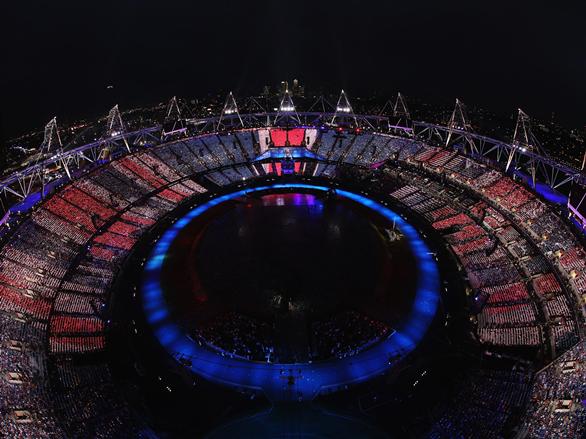At the Olympic opening ceremony, Crystal CG has thrilled audiences as it displayed a range of computer-generated images on a giant video screen stretching across the entire expanse of audience seating.
The giant video screen was made up of small paddle-shaped LED Pixel Tablets designed by Tait Technologies, each attached to a seat in the stadium and bearing 9 full colour pixels arranged in a square. Together, the 70,500 Pixel Tablets created a ‘human powered’ screen of unprecedented size, on which Crystal’s digital animations were displayed.

The images included a giant Union Jack, and a computer generated image of the birth of the internet, which started on the field of play and shot outwards into the audience and beyond.
It was the first time the Pixel Tablets have been used to create such a vast, immersive display at a live event.
“The audience literally became part of the action. No longer limited by large flat screens, we were presented with the challenge of creating animations to bring the stage and the spectators together,” said Will Case, creative director at Crystal. “We delivered. The live audience and those watching at home were drawn into the action. We are witnessing the death of the traditional video screen – this will transform the way event content is presented in future, becoming a more immersive experience.”
Tait Technologies said the cabling infrastructure for the system was some 370km, and was installed by a local crew of ten within five weeks. The total system installation took just ten weeks with five technicians and six local crew members. Because of the nature of its use over the eight week period of the Olympics, the system was installed as a permanent installation. However, the company said rapid deployment options are available for shorter, temporary installations.
“The assembly of dispersed LED pixels to form very large video images has been with us for some time,” explained Frederic Opsomer, CEO of Tait Technologies, who drove the development of the new pixel device. “But never before has it been done on such a scale, and with such organic animation.”
A team of 50 designers from Crystal London delivered the project content in just 14 weeks. The first tests were performed in the Olympic Stadium on 10th July and a final test run was done at the dress rehearsals last week. Over 70 minutes of animations were all custom-designed for the concave, bowl shape of the 360˚ screen, and the company claims that requests for additional content were landing in the creative team’s inboxes up to the last minute.





 CN
TW
EN
CN
TW
EN






